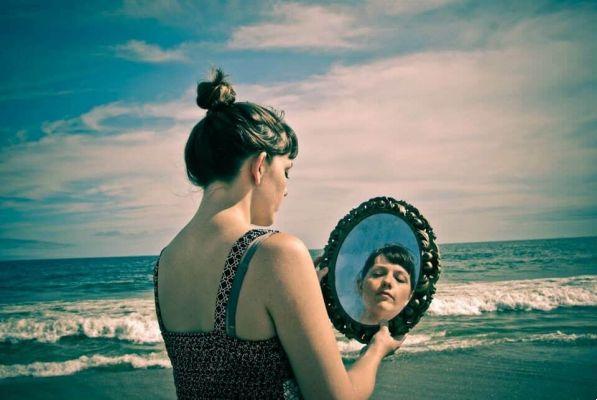“One argument remains: anyone can, at the same time, see the face of another and its reflection in the mirror. Without sophistry, I refute it. The experiment, by the way, not yet carried out rigorously, would lack scientific value, in view of the irreducible deformations of a psychological nature. Try, indeed, to do so, and you will have notable surprises.”
In “O Mirror”, a short story by the Spanish writer Guimarães Rosa, the lyrical self suggests that the interlocutor looks at himself in a mirror. Beforehand, he states that the result will be surprising, because we tend to deform our image according to our feelings and emotions. What does that mean?
The only way a person can see their face in the present tense is through a reflection. Photographs, even the most recent, will always capture the past, but mirrors allow us to look at our image exactly as it is and is. However, the appearance we have can look different according to certain thoughts we have about who we are.

If a person suffers from an image disorder, for example, the figure he will see on a reflective surface will not be consistent with reality. Or a person who hates his own ears may direct his gaze to that particular part of his body and forget about the rest, as if that one defect was what caught everyone else's attention.
Standing in front of a mirror can be a challenge for people who don't like the way they look, but this is also the way to look at yourself with a new perspective. In this sense, mirror therapy is capable of promoting a revolution in the way we deal with our appearance and with what lies beneath it: who we really are.
Problems with the mirror
Before knowing the benefits of mirror therapy, as well as the best way to practice it, it is necessary to understand how much this reflective instrument influences a person's self-esteem.
The first thing a stranger will notice about who we are is our appearance, especially if it's a live, color encounter. Before we even say a word, our interlocutor will know the color of our skin, our eyes and our hair, the shape of our bodies and the clothes we choose to wear.
A person's appearance is a determining factor in how he will be treated by society. People with disabilities, black, Asian, indigenous or fat will not be treated in the same way as people who meet the standard of beauty constructed as an ideal by the media and European peoples.

Prejudice against the most different parts of the population, in this way, is also responsible for changing the way a person can see himself in front of a mirror. If a woman hears all her life that she should be thin and white, she will gradually believe that being fat and black is not acceptable, for example.
The existence and imposition of a standard of beauty is still responsible for other types of effects on self-esteem. Body Dysmorphic Disorder (BDD), which affects about 2% of the world's population, is a disease that prevents an individual from seeing himself as he really is. A thin person can see themselves as fat, if they have BDD, and develop other illnesses, such as eating disorders, depression, anxiety and low self-esteem.
For people who suffer from any of the aforementioned diseases, looking in the mirror can be an exhausting and exhausting action. That's why, if you fall into this group, you should seek psychological help before putting mirror therapy into practice. Although it is a method that does not require the use of medication, it is best to ensure that you do not get worse by doing it.
What is mirror therapy and what is it for?
Mirror therapy is an exercise that can be done daily. The purpose of this way of looking at oneself is to evaluate one's own physical, mental and emotional characteristics, reflecting on qualities, defects and decisions.

From this observation and the consequent analysis of the issues that make up who you are, there are some advantages that can be perceived in your daily life and that will be better explored in the following topics.
In summary, mirror therapy is an exercise that increases self-esteem, promotes self-knowledge, helps in decision-making and in building more positive images about our main characteristics.
Signs you need mirror therapy
Now that you understand what mirror therapy is all about, it's time to find out if you should do it, based on the five signs we've separated. If you don't identify with the signs listed below and still want to put this exercise into practice, no problem! Developing your own self-knowledge will always be allowed.
1) Difficulty making a presentation
When we are in a situation that will put us in the spotlight in front of other people, nervousness and anxiety can get in the way of our confidence. Many people feel that they are unable to give a presentation or hold a conversation because they are afraid that something will go wrong.
This is a sign that you suffer from low self-esteem, so you need to look at yourself differently. Are you a person who cannot speak in public? Should all your knowledge be kept within you? Save these questions for later.
2) Feeling that no clothes value you

Another sign of low self-esteem is the feeling that no clothes value your body. In many cases, it's possible that a person has told you that your weight prevents you from wearing the look you wanted to wear and that it looked perfect until you heard that opinion.
It's hard to look in the mirror without hearing other people's criticisms. If this is happening to you often, think about the following questions: Who should like the clothes I wear? What do I want to say about myself by the clothes I choose?
3) Desire to solve a problem
Sometimes you are the best person who can get advice on a problem. What is often called “listening to the heart” is not only a necessity, but also a simple solution to issues that may seem very complex.
If you feel like you can't take your wants and desires into account when making a decision, you may need to take a closer look at yourself. Think about the following questions: How do I feel about this? Is this the option I like the most in this situation?
4) Willingness to know more about your characteristics
If you've ever faced a question like, "What are your strengths and weaknesses?" and didn't know how to answer, maybe you need to know yourself more. In the process of self-knowledge, you will know not only the characteristics that mark your personality, but also what you like to do and what your projects and plans are.

Although this is a long process, there are some questions that can guide you, such as: what do I love to do most? What do I like most about myself? What I don't like about myself? Do I like to be with myself when I'm alone?
5) Feeling of not fitting into the imposed standards
The fifth sign that you should do mirror therapy concerns many people around the world. Fitting the imposed standards always seems to be the best way to live free from any kind of problem. As the aesthetics of behavior and beauty are almost unattainable, however, the best we can do is to know and love who we are.
If you want to free yourself from the negative images that other people have built about you and that are always bothering you, mirror therapy is a safe path. For this question, consider reflections such as: Why do other people believe I am inferior? Why do I care so much about other people's opinions of me? What can I do to value my existence?
Practice mirror therapy
Knowing the benefits you can get from mirror therapy and when you should practice it, it's time to put your eyes and mind to work! Follow five simple steps, but with profound results, to apply mirror therapy to perfection!
1) Choose a suitable place

Choose a room with a mirror that is quiet and clean, with few distractions from the wall. A place full of images, for example, or with poor lighting can impair your vision and concentration during exercise. You can stand or sit in front of the mirror, whichever is most comfortable for you.
2) Contemplate your body
Set aside the opening minutes of mirror therapy to look at yourself. With affection in your eyes, analyze your face, your body or the clothes you are wearing. Think about everything you love most about your appearance. If you feel better, imagine that the body you are looking at is someone else's. Do you feel happy? What would you like to change? Is the change necessary?
3) Organize your thoughts
For mirror therapy to work efficiently, you must organize the topics you want to work on while looking at yourself into sectors. You can make a separation similar to this: me, family, friendship, work, projects. Take the time to think about each of these sections. Ask yourself questions out loud and answer them out loud. Is the relationship you have with each of these sectors the best possible? Is there any behavior or any point that should be rethought or discussed?
You may also like
- Find in yourself what you are looking for in someone else
- Discover other ways to boost your self-esteem
- Know how to take advantage of your best qualities
4) Talk to yourself
For this step, all you need to do is talk aloud to yourself. It's time to let your deepest feelings flow through words. Put out everything that is hurting you or worrying you and question where it all comes from. If you feel guilty about something, say so. Look at your reflection as carefully as you would at a loved one, and let go of those bad thoughts and feelings.
5) Remain silent
To end mirror therapy, you must remain silent. Think about your appearance and your interior. Reflect on how much better you know yourself after this exercise. Run your hands over your body and cherish everything in you. Look in the mirror with the certainty that you are evolving more and more.

























